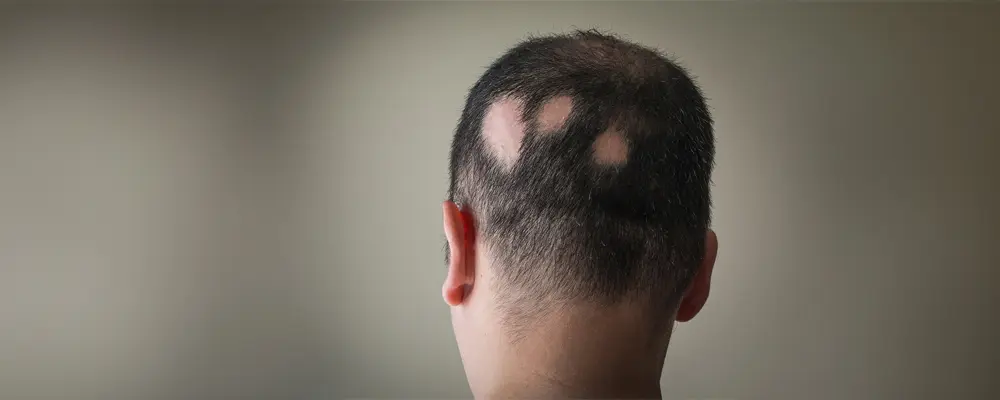Introduction
Alopecia areata presents itself in different forms, sometimes ranging from receding hairlines creeping away from the forehead to sudden emergence of bald patches, as well as strands that progressively thin and shed in clumps. This kind of hair condition is an autoimmune disorder resulting in hair loss. However, effective alopecia areata self-care helps eradicate symptoms and serves as a vital component of managing the condition.
While certain medical interventions may occasionally reverse hair loss, it is equally important to cultivate comfort and confidence with self-care practices. It may result in challenges like patchy scalp or missing eyelashes.
This article delves into various alopecia areata self-care options, including self-care practices, over-the-counter medications, and a few dietary modifications.
This condition can significantly impact various aspects of life. However, implementing these alopecia areata self-care tips and seeking potential alopecia areata treatments can effectively help in managing its symptoms.
Handle Hair & Scalp with Care
To take care of hair, one must opt for a soft-bristled brush and wide-tooth comb while styling hair. These tools are gentler and less likely to cause hair pulling. Try to opt for fragrance-free alternatives while choosing hair products. Moreover, it is essential to choose loose hairstyles over tight ones like ponytails and cornrows.
Don’ts
- Avoid hair and skin care products containing harsh chemicals
- Steer clear of hair dyes and hair care products with fragrance or alcohol
- Avoid heat from blow dryers or other styling tools
- Avoid tight hairstyles can tug on the scalp, exacerbating hair loss
Protect Bald or Thinning Areas from Sun
Shielding thinning areas of the scalp from the sun’s rays is essential because the presence of balding or thinning hair on the scalp heightens the risk of sunburn. It is suggested by dermatologists at Revival to wear a wide-brimmed hat or wig when outdoors. Moreover, it is essential to apply sunscreen with SPF 30 or higher, ensuring it offers water resistance and broad-spectrum protection. Additionally, sunscreen must be applied to all exposed skin while outdoors, paying special attention to areas with hair loss. One must reapply every two hours and after perspiring or if the head becomes wet.
Don’ts
- Don’t expose bald or thinning areas to prolonged sunlight without protection
- Don’t underestimate the importance of consistent sun protection, even on cloudy days
- Don’t rely solely on hats or wigs for sun protection
Protect Eyes if Eyelashes or Eyebrows are Lost
Eyebrows and eyelashes serve as natural barriers protecting the eyes against sweat, light, dust, rain, dust and microorganisms. If eyebrows or eyelashes are lost, one can consider wearing a hat, sweatband, or glasses. Besides, utilizing artificial eyebrows or eyelashes. Some potential treatment for Alopecia Areata might help to regrow hair back. It is, therefore, essential to consult a healthcare professional.
Don’ts
- Don’t rub or excessively touch the eyes, which can increase irritation
- Don’t neglect eye protection if experiencing eyelash or eyebrow loss
- Don’t use harsh or abrasive products near the eye area
Use of Over-the-Counter Medication
Rogaine, also called minoxidil when applied to the skin, functions by enhancing blood circulation to the hair follicles and prolonging their growth phase. It is accessible without a prescription in solution or foam form and typically can be applied twice daily to the scalp. Rogaine proves beneficial primarily for individuals experiencing initial hair loss or as an initial step in alopecia areata self-care at home. However, for a more severe case, clinical trials can be a good option.
Don’ts
- Don’t expect immediate results
- Don’t exceed the recommended dosage provided on the packaging
- Don’t use if allergic or sensitive
Learn to Avoid Stress with Care
Learning effective stress management techniques, like meditation or yoga, can help alleviate the impact of alopecia areata, which often involves unpredictable cycles of hair loss and regrowth. Many individuals note heightened stress levels before these cycles occur. However, learning to battle stress can be beneficial.
Don’ts
- Don’t neglect adequate sleep and nutrition
- Don’t isolate yourself, seek emotional support from friends, family or support groups
- Don’t ignore physical activity since regular exercise can help reduce stress levels
- Avoid over-reliance on unhealthy copying mechanism such as smoking or screentime
Consume Anti-Inflammatory Diets
Research has shown potential benefits of adopting an anti-inflammatory diet for alopecia areata self-care. This diet includes fruits, vegetables, lean protein, nuts, seeds, and healthy fats. A study has shown remarkable remission of symptoms in an individual following a monitored anti-inflammatory diet. Hence, modifying dietary choices may potentially help in reversing symptoms associated with the condition.
Don’ts
Don’ts
- Don’t consume foods high in omega-6 fatty acids such as high-fat dairy products
- Don’t go for foods with high glycemic index (GI) like sugar and refined grains
Also Read: Combatting Postpartum Food Allergies
It is suggested to consult a healthcare professional before starting any alopecia areata self-care. Alopecia manifests in many different types and exploring potential treatment options can be of great benefit.
Summary
Alopecia areata, an autoimmune condition, results in hair loss for those affected. Many individuals opt for different kinds of treatment due to its impact on self-image and self-esteem. Hence, it is crucial for individuals with the condition to handle hair and scalp with gentleness, avoiding harsh chemicals and heat, including protecting bald or thinning areas from the sun with sunscreen. Therefore, by following alopecia areata self-care strategies, one can potentially help alleviate its symptoms for better management.




